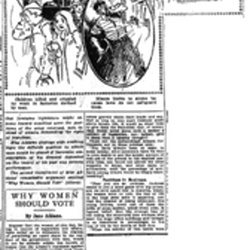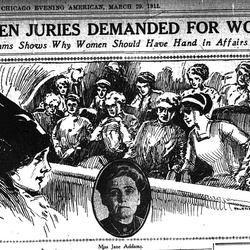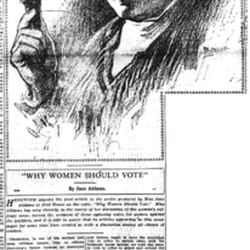SHOWS WHY MEN MAY BE UNFIT TO VOTE
Jane Addams Says They Have Botched Laws to Protect Life
Women and Children Made to Suffer Cruelly by Man-Made Statutes.
[image] Jane Addams denies right of franchise to men.
[image] (VOTES FOR MEN) (VOTES FOR MEN) (EQUAL RIGHTS)
[image] Women broken on wheel of machine in sweatshops under man-made laws.
[image] Children killed and crippled by work in factories devised by men.
[image] Miner blown to atoms because laws do not safeguard them.
MISS JANE ADDAMS, one of the foremost and most powerful advocates of woman's suffrage in the world, prepared for the Chicago Evening American a series of four articles, of which this is the second, in which she satirically emphasizes the attitude that feminine legislators might assume toward mankind were the positions of the sexes reversed, men instead of women demanding the right of franchise.
Miss Addams displays with scathing logic the difficult position in which man would be placed if favorable consideration of his demand depended on the record of his past and present performance. The second installment of Miss Addams' remarkable argument entitled "Why Women Should Vote" follows:
WHY WOMEN SHOULD VOTE
By Jane Addams.
Suppose that the women of this day, being in control of legislation and affairs, were called on to deliberate the wisdom of permitting an equal share in the conduct of the government with men, would it not be entirely within the bounds of reason that the woman's argument against such a departure might include such statements of fact as I have already indicated, and might she not well continue in this strain:
"We have heard that in certain states, in order to save the paltry price of a guard which would protect a dangerous machine, men legislators allow careless boys and girls to lose their fingers and sometimes their hands, thereby crippling their entire futures. These male legislators do not make guarded machinery obligatory, although they know that when the heads of families are injured at these unprotected machines, the state must care for them in hospitals, and when they are killed, that, if necessary, the state must provide for their widows and children in poorhouses."
Can't Understand Youth.
These wise women governing the state with the same care they had always put into the management of their families, would further charge these men who were seeking the franchise with the fact that men do not really know how tender and delicate children are, and might put them to work in factories, as indeed they have done in man-made states during the entire period of factory production. We can imagine these women saying:
"We have been told that in certain states children are taken from their beds in the early morning, before it is light, and carried into cotton mills, where they are made to run back and forth tending the spinning frames, until their immature little bodies are so bent and strained that they never regain their normal shapes; we have heard that because glassblowers have a tradition that their soft material must be carried quickly by boys into a hot oven, therefore these masculine legislators permit boys to work not only by day, but also by night.
"These boys, coming directly from the heat of the furnace into the chill of the early morning, contract pneumonia, although we know for a fact that the men legislators will not read the statistics showing the relation of this disease to the children in glass factories, even when such statistics, neatly printed, are laid upon their legislative desks."
Would not these same big-hearted women, accustomed to responsibility, instance that ghastly thing which happens every day in every industrial city of America where a girl stands at a machine pushing down a lever with her right foot, for it would involve a slight expense to make a machine adjustable, so that she might transfer the strain from one foot to another. And yet physicians say that if a girl does this steadily for six months there is such a displacement of her organs that she will probably never be able to bear a child.
Would not these responsible women voters gravely shake their heads and say, that so long as men exalt business profit above human life, it would be sheer folly to give them the franchise; that, of course, they would never make such a matter a subject of legislation, nor, indeed, give it more than a passing thought?
Could not the enfranchised women furthermore say to these voteless men:
"You have always been so eager to make money; what assurance have we that in your desire to get the largest amount of coal out of the ground in the shortest possible time, you would not permit the mine supports to decay, and mine damp to accumulate, until the percentage of accidents among miners would be simply heartbreaking?"
Reckless in Business.
"Then you are so reckless, business seems to you a mere game with big prizes, and we have heard that in America, where the women have no vote, the loss of life in the huge steel mills is appalling, and that the number of young brakemen, fine young fellows, every one of them the pride of some mother, killed every year, is beyond belief; that the average loss of life [among] the structural iron workers who erect the huge office buildings and bridges is as disastrous in percentages as the loss of life in the Battle of Bull Run.
"When the returns of this battle were reported to President Lincoln, he burst into tears of sorrow and chagrin, but we have never heard of any Mayor, Governor or President weeping over the reports of this daily loss of life, although such reports have been presented to them by governmental investigators, and this loss of life might easily be reduced by protective legislation."
Having thus worked themselves into a fine state of irritation, analogous to that ever recurrent uneasiness of men in the presence of insurgent women who would interfere in the management of the state, would not these voting women add: "The trouble is that men have no imagination, or rather what they have is so prone to run in the historic direction of the glory of the battlefield, that you cannot trust them with industrial affairs.
"Because a crew in a battleship was once lost under circumstances which suggested perfidy, the male representatives of two great nations voted to go to war; yet in one day of the year in one of these nations alone, the United States of America, as many men are killed through industrial accidents as this crew contained. These accidents occur under circumstances which, if not perfidious, are at least so criminally indifferent to human life as to merit Kipling's characterization that the industrial situation is impious.
"Certainly these irritated women would designate such indifference to human life as unpatriotic and unjustifiable, only to be accounted for because men have not yet learned to connect patriotism with industrial affairs."









Comments